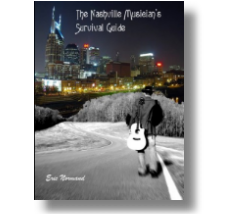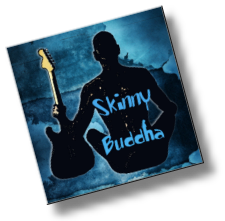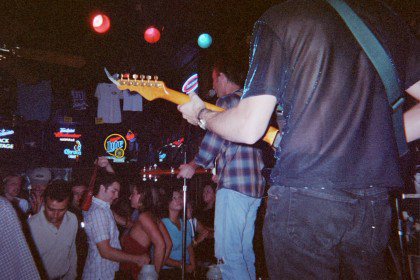
Have you ever played a gig that seemed to go on forever? I’m not talking about your typical three to four hour bar band performance that occasionally might drag a little in the middle, or some uninspired club gig full of “T n’ A” (tables and ashtrays). No, I’m talking about a gig that goes on for hours and hours, eight hours to be exact, by the end of which you felt like you aged 10 years. A few years back I did a few gigs like this, and lived to tell about it.
With thousands of singers and musicians trying to break into the Nashville nightclub scene and only so many potential gigs, the scene here can be quite competitive. And if you’ve been in Nashville for a while, you know all too well that these clubs are not known for their “great pay”. These two facts combined might cause some players to take on gigs that, in another part of the country, would be laughed 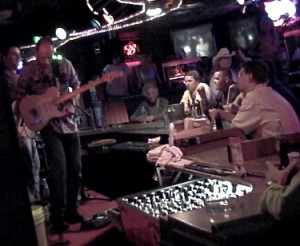 out the door.
out the door.
Don’t get me wrong; there are some club gigs around town that can be lucrative, a few even providing a guarantee of $100 or more per player. But most club gigs in Nashville are tips only, or provide a minimal base pay (usually $20-$50 per player), plus tips. So if you want to make some decent money, you really have to hustle.
Relying on tips causes many club bands to play a three to four hour shift without taking a break, and if a player needs to go to the bathroom the singer might do a few acoustic numbers to provide the band with at least one “pee break”. Relying so greatly on the tip jar for income also causes some singers and bands to exclusively cater to the tourists, choosing worn out dance floor classics like “Margaritaville”, “Sweet Home Alabama” and “Mustang Sally” to keep them happily bopping along.
Several years back I was working pretty steadily downtown, playing a lot of shifts at Tootsies, the Second Fiddle, and a few others on the strip. Around the same time there was another club just a few streets off of Broadway at which I also began performing (to save face, this club will remain anonymous, although its identity will be obvious to anyone who has ever worked this gig). For the purposes of this blog, I will refer to the club owner as “Harry” and the club as “Harry Houdini’s”.
I got to know Harry by hanging out at his club and sitting in on occasion. He liked my playing, and when the guitarist in his weekend house band quit, he offered me the spot. I was hungry for good paying work, and he offered to pay me $125 a night – straight pay with no tips. By Nashville standards, this was great pay for an in-town club gig. There was just one catch – the band was required to play from 7 PM to 3 AM. What?
“Don’t worry, I’ll give you plenty of breaks” Harry assured me. “You can even play sitting on a stool when you get tired”.
Like I said, good paying gigs are hard to find in Nashville, and at this point in time I really needed the dough. Besides, I had already experienced playing some “doubles” on Broadway (for those of you not in the know, this is two shifts back to back, with about a 30 minute break in between shows for change over). The doubles were hard work, but I had built up the necessary stamina, and the extra pay was helping. So what the hell, it can’t be much worse than a double, why not give it a shot?
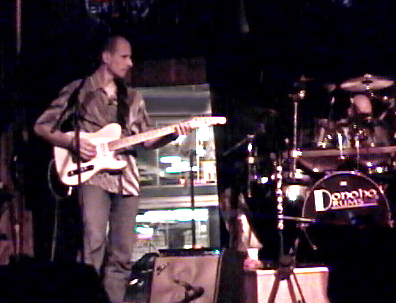 The day of my first gig at this fine establishment I arrived about 20 minutes early, loaded in my gear, and anxiously awaited downbeat. The group consisted of drums, bass, me on guitar, and a singer who also played acoustic. The song list was typical of downtown cover music – classic and new country, pop and rock, and for the first couple of hours, it seemed like just another typical bar gig in Nashville. I even got to take a short break around nine.
The day of my first gig at this fine establishment I arrived about 20 minutes early, loaded in my gear, and anxiously awaited downbeat. The group consisted of drums, bass, me on guitar, and a singer who also played acoustic. The song list was typical of downtown cover music – classic and new country, pop and rock, and for the first couple of hours, it seemed like just another typical bar gig in Nashville. I even got to take a short break around nine.
Then the dynamic of the night began to change. Harry, the club owner, was also a musician, and he came up and sang a set with the band. Some of the songs we played were the previously mentioned classics of “Margaritaville”, “Sweet Home”, and “Mustang Sally”, but we also added to the mix other worn-out wonders like “Brown Eyed Girl”, “Family Tradition”, and the often dreaded “You Never Even Called Me by My Name”.
It was a warm Friday night and the crowd, which seemed to be mainly tourists, seemed happy with what we were doing, we even got a dance floor going. The singer/owner finished his set and went back to work behind the bar, and the other singer came back to take over for a while. Another 45 minutes or so and we got our next pee break while the singer sang a couple tunes solo with his acoustic.
It was now after 11 o’clock, about the average length of a typical bar gig, and Harry again returned to the stage. To my surprise, this next set contained several of the same songs that we played in his first set, most of them being the aforementioned “classics”, a couple of which had also been covered by the other singer.
On our next pee break, sometime around 12:30 AM, I mentioned to the drummer something like “Boy he really likes those oldies. Does he always repeat those songs so much?”
“You ain’t seen nothin’ yet, we’re just getting started. Typically, he wants us to play Margaritaville, Sweet Home, Mustang Sally and Family Tradition about once an hour.” he said to my amazement. “His theory is that the tourists love these songs, and that with the high turnover, it doesn’t really matter how many times we play them.”
Ooookaaay.
Moments later I resumed my perch on the stage to continue my birds-eye view of this top 40 adventure, one that seemed to be entering some kind of classic-hit time warp. I remember looking up at the clock behind the bar a little while later and it reading something like 12:48. Except for the three or four 10 minute pee breaks, I had been playing this gig for about six hours, with two more hours to go, and it began to feel like I had been on the stage for days.
The crowd was now pretty thin, but we marched on. With Harry back on the mic, he asked the crowd “do we have any Lynyrds Skynyrd fans in the house?” With a couple of random cheers forthcoming, we launched into Sweet home Alabama again, now for the fifth time. The same thing happened with some of the other classics. I looked up at the clock a little while later and it was around 1:30. The more we kept repeating songs, the slower the clock seemed to move. At one point my mind flashed to the scene in the movie “Risky Business”, where the character played by Tom Cruise witnesses the clock going backwards right before the bell was supposed to ring.
By the end of the night, I was drenched in sweat and physically and mentally exhausted. My back was sore, my fingers shredded, and my mind numb. We had played Sweet Home Alabama, Mustang Sally, and Family Tradition seven times each throughout the night. Some of the other songs we played four to five times a piece. The funny thing was, the patrons never seemed to notice or care. Harry was right; there was a high turnover, and whatever crowd we had at any given moment seemed to enjoy the songs.
I collected my pay and went home, returning the next evening to do it all over again. As lucrative for an in-town gig as this was, I only lasted a few short weekends before moving onto something else. After a few years I was able to get over my “classic hits overdose”, but for the months following this episode, I suffered severe flashbacks every time somebody called out Sweet Home Alabama and Mustang Sally.
Berklee is alive and well in Nashville! On Monday, November 7 we had our first “New to Nashville” Berklee alumni reception at the NSAI studio on Music Row, and the event was a huge success. Upon the suggestion of Berklee Alumni Affairs Officer, Karen Bell, I put this event together to welcome alum’s who recently relocated to Nashville.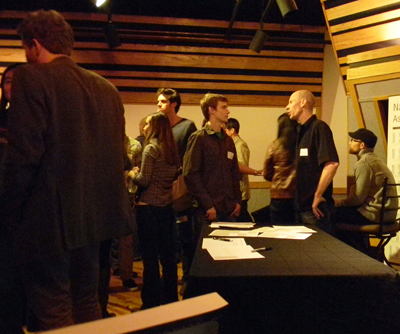
The reception was a three stage event. The meet and greet gave recent transplants a chance to reconnect with their fellow classmates while forming new relationships with some of the alumni who have already been here a while. From what I could tell, out of the 40 or so in attendance, at least half were new arrivals.
After about an hour, everybody took their seats and I gave a brief talk about my Nashville experiences. The talk evolved into a pretty good group discussion, with lots of questions about networking in Nashville. Most of my experience in Nashville has been in the areas of touring, gigging around town, and recording, and most of this discussion centered on these issues.
One alum asked about what clubs and situations would lend themselves for sitting-in with bands. Sitting-in is a great way to build your reputation while making connections that might lead to gigs, and I mentioned a few that are worth checking out – The Fiddle and Steel has a player-friendly jam every Tuesday night; Douglas Corner has “The Loud Jazz Players Jam” every other Monday night; and there are also a few blues jams around the city including one at Carol Ann’s Café on Sunday nights, and The Fillin’ Station on Thursday nights. I also suggested becoming a regular at some of the clubs on Broadway, as this is also a good place to meet players who are gigging regularly.
Rich Redmond, one of the contributors to my book “The Nashville Musician’s Survival Guide”, has one piece of great advice he gives to players who are new to town, and I passed this advice on in response to a question about evolving a music career in Nashville – “Be patient, and take every gig that is offered”. Every gig will potentially lead to more gigs, and no matter how unimportant some gigs might seem, you never know where those roads might lead.
We paused briefly after my talk to give everyone a chance to stretch their legs and grab some more 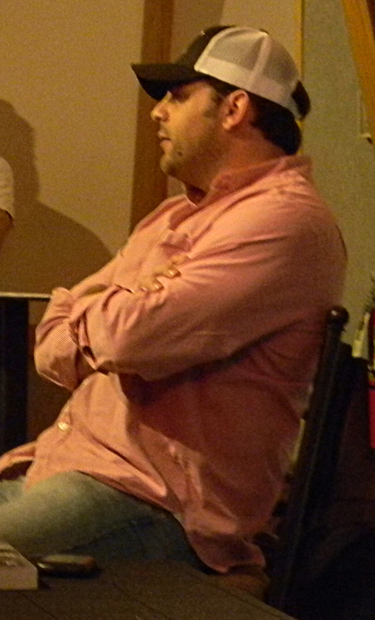 refreshments. Then everybody settled back down into their seats and I proudly introduced the night’s final speaker – country music artist, hit songwriter, BMI songwriter of the year, and my current boss, Rhett Akins. For those of you who aren’t in the know, Rhett is currently one of the hottest songwriters in Nashville, and he shared some great perspective, stories, and advice for all of the songwriters in the room (and judging by a show of hands a little earlier, at least half of those in attendance had come to Nashville to pursue careers in songwriting).
refreshments. Then everybody settled back down into their seats and I proudly introduced the night’s final speaker – country music artist, hit songwriter, BMI songwriter of the year, and my current boss, Rhett Akins. For those of you who aren’t in the know, Rhett is currently one of the hottest songwriters in Nashville, and he shared some great perspective, stories, and advice for all of the songwriters in the room (and judging by a show of hands a little earlier, at least half of those in attendance had come to Nashville to pursue careers in songwriting).
After Rhett’s brief talk about his evolution as a songwriter and artist he also engaged in a group discussion. He spoke candidly about different aspects of being a Nashville songwriter. The Nashville uniqueness of 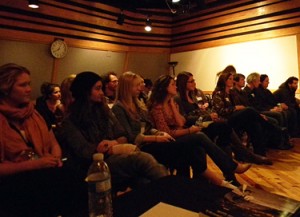 co-writing, the pros and cons of publishing deals, and his lifelong passion for music and songwriting were some major talking points.
co-writing, the pros and cons of publishing deals, and his lifelong passion for music and songwriting were some major talking points.
Some of the perspective he shared that I found most interesting was the sheer number of songs that he writes, stating “I pretty much write at least one song everyday” and that to wind up with five hits songs, he’s probably written 500 songs. He also said that he and his co-writers try to finish a song during each writing appointment, but that he is also interested in experimenting with writing some songs over a longer period of time, noting that “it took Gregg Allman three years to write Melissa”. After his talk concluded he stuck around for a while, giving those who were interested a chance to speak with him one-on-one.
All in all, the event accomplished what we had set out to do. Some of the newest arrivals to Nashville got a chance to reconnect with former classmates that they didn’t even know had moved here, others made new friendships, and many, myself included, got new insights into the ever-changing world of the Nashville music biz’.
I would like to send out a special thanks to the following people for helping make this event a success: Rhett Akins, Karen Bell, Emily Dufresne, Dave Petrelli, Meg O’Brien, NSAI, Berklee, Heston Alley, and Kelly Normand.
Epilogue: I met with Alumni Programs Officer, Emily Dufresne the following afternoon for coffee, and we discussed an idea I had about organizing a monthly “Berklee Alumni Networking Jam”. More info on that will be coming soon!
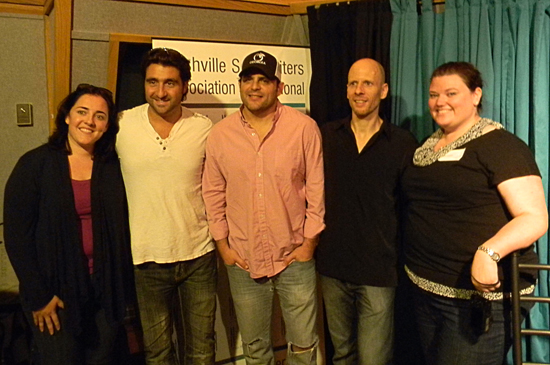 From left to right: Meg O’Brien, Dave Petrelli, Rhett Akins, Eric Normand, Emily Dufresne
From left to right: Meg O’Brien, Dave Petrelli, Rhett Akins, Eric Normand, Emily Dufresne
As some of you might know, there’s a lot going on in Nashville this week. It’s that time of year again where 250,000 country music fans converge on the city for “CMA Music Fest Week” (formally known as Fanfare). Tourists, country music fans, and curiosity seekers from all over the globe will fill the streets, shops, hotels, restaurants, nightclubs and concert halls, and while this can make getting around a little sticky for the locals, it is truly an exciting week for Music City, not to mention good for the local economy. This year, I am fortunate to play my own part in these festivities.
Thursday, June 9 from 11 AM – 2 PM I will be doing a book signing at the Charlie Daniels Museum on Second Avenue in downtown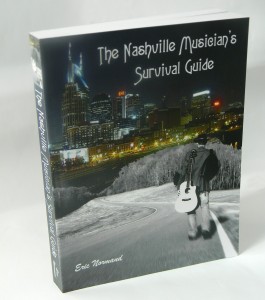 Nashville (between the Hard Rock Café and the Wildhorse Saloon.) This unique museum/gift shop began selling my book last week at which time I was fortunate to meet the museum’s owner, Bud Messer, who requested I come back and do and in-store signing during Fanfare. Bud is a great guy and I am honored to receive this invitation from such a prestigious institution, not to mention the fact that they are now selling my book. (The Ernest Tubb Record Shop on Broadway is also now selling my book.)
Nashville (between the Hard Rock Café and the Wildhorse Saloon.) This unique museum/gift shop began selling my book last week at which time I was fortunate to meet the museum’s owner, Bud Messer, who requested I come back and do and in-store signing during Fanfare. Bud is a great guy and I am honored to receive this invitation from such a prestigious institution, not to mention the fact that they are now selling my book. (The Ernest Tubb Record Shop on Broadway is also now selling my book.)
This Saturday, June 11 my band will be performing at The Fillin’ Station in Kingston Springs. The fun starts at 7 PM, and if the weather is good (which it looks like it will be), the outdoor patio will be open. This week the band will consist of me on vocals and guitar, Nick “Shaggy Bag” Forchione on drums, Tom Good on bass, and special guest Patrick Weikenand (formerly of the band “War”) on harp and beer slinging. This club is a one-of-a-kind experience, so if you’ve never been, you owe it to yourself to check it out. (no cover.)
Monday, June 13 I will be giving my first talk on the book when I host “The Nashville Musician’s Survival Guide Workshop” at Corky’s Ribs & BBQ, 100 Franklin Road, Brentwood, TN 37027. This luncheon will be sponsored by “Indie Connect” and held between 11:30 AM and 1:30 PM. Cost $10.00. This presentation will be somewhat informal and there will be a lot of questions and answers, networking and group interaction.
Other than that, it’s been hot as hell in middle Tennessee for the past month, and we’ve had over 10 straight days of 90° plus heat with no end in sight. Stay on the lookout for heat and poor air-quality advisories.
So that’s it for now, if you’re around, please stop in to one of my events or gigs and say hi.
Hey everybody, I realize that I haven’t been writing very many blogs over the past couple of months and I feel like I owe y’all a few. This lack of regular blogging is mostly because of the frantic pace I kept while trying to finish the book. I’m going to do my best to put out a new blog everyday (or so) for a while.
When I first moved to Nashville, back in the summer of 2002, I was hungry for work. But gigs, especially gigs that paid well, seemed few and far between. My mentor and friend, “D” gave me tons of good advice, including networking on the town as often as I could. I followed this advice, going out on the town four or five nights a week, taking every oddball gig that was offered, sitting in whenever I could, etc. After six months of this routine, although I was making a lot of friends and connections, I still didn’t have any consistent gigs that paid any real money to speak of.
So one day I told him “Things just don’t seem to be evolving very fast for me. I’m going out on the town all the time, sitting in, making friends and networking, but the phone just isn’t ringing very much. What am I doing wrong?”
His response was quite simple, although I wouldn’t entirely comprehend the entirety of it for a couple of years.
“Patience my boy, Rome wasn’t built in a day. This town goes at its own speed. You’re doing all the right things and making a good impression around town. Everyone I’ve introduced you to likes you and you’re building a good reputation for yourself. The people you are meeting today and the relationships you build with them are what is going to give you work five years from now.”
Although that last statement was probably the most important thing he said during our conversation, the things that I heard the loudest were “This town goes at its own speed,” and “five years.” Geeesh! The Nashville music scene goes in slow motion, and I have to wait five years to get busy – NOT exactly what I wanted to hear!
But looking back at that moment, now going on 10 years into my Nashville life, those telling words make so much sense. I met a lot of people during that first hard year of Nashville – musicians, engineers, songwriters, artists, etc. – and became friends with many of them. In the years that followed, many of these friends and acquaintances would eventually call me for work. Sometimes it was a simple “one-off” gig, other times it was several gigs, sometimes it was songwriter demos.
In 2006 I did a ton of gigs on Broadway, mostly at Tootsies, but also at The Stage and a few other clubs on the strip. It was good supplemental income, good for my chops, and I met and gigged with several great players whom I became good friends with in the years that followed. These gigs all started with one phone call from a guitar player friend I had met during my first couple of months in town. He subbed out a few gigs to me, these gigs led to more gigs, and before I knew it I had all the work I could handle on the strip – All because of one relationship.
Several years later I was working more as a touring musician and no longer gigging regularly downtown. On many occasions I found myself in need of musicians for different situations, and ended up calling players I had met during those earlier years of steady gigging on Broadway. Sometimes I would need a player last minute and call someone I hadn’t even spoken to for a couple of years, someone that had obviously made a good impression at an earlier point in time.
I have learned that the town (and life for that matter) does go at its own speed, and quite often that speed is slower than we would all like. But I have also learned that there really is a lot of truth to “The people you are meeting today and the relationships you build with them are what is going to give you work five years from now.”
As some of you may know, and for those of you who don’t know, I have just released my book “The Nashville Musician’s Survival Guide.” This street-level perspective of the music-related jobs in the Nashville music industry is now available in print version, and the e-book will be available within a few days. To purchase your own copy, follow this link.
The ever churning music scene of Nashville can be kind of quirky. Even though it has downsized a bit since its heyday of the booming 90s, it’s still a constant flurry of activity, with thousands of musicians of all levels and backgrounds continually searching and on the move. Searching for gigs, connections, opportunities, and quite often, searching for a pathway to a success that has yet to be defined. We’re all on the hunt for something more.
That’s how I felt when I first moved to Nashville, nearly 10 years ago. I didn’t really know exactly what I wanted to do here; I just knew I wanted to accomplish more than I had in my previous life as a nightclub performer and music teacher in New England. I can remember the sense of impatience and anxiety I felt during that first year, the endless thirst for musical activity – no gig was too big or small.
As a fresh arrival in 2002, I knew very little about how this place worked and relied on my friend and mentor “D” to fill in the blanks. “If you are looking for paying gigs, the country scene is where it’s at. It’s pretty much a freelance scene, but that’s where you’ll make the connections you’ll need to survive. Just get out there and start hitting the clubs and get to know people, sit-in whenever you can. But whatever you do, don’t join a band, bands starve.” All sound advice coming from a successful player who had already been here for 10 years.
“I’m really into blues and rock. Is there a scene here for that? I asked innocently. “There is, but you’re going to go broke if you only play that stuff here” was his reply “Plus you’ll get pigeonholed”. “Well if all this activity is basically hired guns, how do you just have a band for fun?” I asked, not wanting to accept this new fate. His solution was so simple – “After you get to know and become friends with some good players, just pick a night, book a gig, and go make some music with your buddies.”
While his advice made a lot of sense, it would take years for me to fully realize this new potential. I began digging in to the scene, networking, sitting in, and this approach worked. I played hundreds of gigs around the city during those first couple of years – Broadway gigs, Printers Alley gigs, gigs on the outskirts, showcases – you name it I played it. These gigs eventually lead to touring work and a couple of years later I began playing on songwriter demos too.
Now it’s 2011 and I’ve been here for nearly 10 years. I can’t believe how fast time flies, the last decade was a blur of endless activity. I didn’t move to Nashville to become a superstar or a songwriter, I came here to work as a player, and I’ve succeeded in that endeavor. I make my living (or the bulk of it) as a freelance musician, something I was not able to do prior to my Nashville days.
But something has still been missing and I just recently figured out what it was. I haven’t been playing music enough for the sheer joy of it. Nearly all of my music career dreams have come true. I’ve played in every state in the lower 48, Canada, parts of Europe; 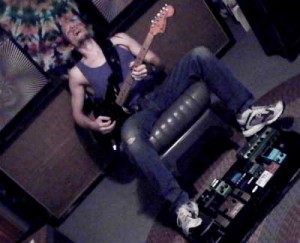 I’ve learned how to play guitar on recording sessions; I’m good friends with some of the finest musicians on the planet; I’m earning a living from my craft. But where’s the self-expression within all of this? Don’t get me wrong, there’s plenty of good music involved in what I do. But a lot of the music I do for pay is the result of somebody else’s expression, and at times, lacking a personal connection to me.
I’ve learned how to play guitar on recording sessions; I’m good friends with some of the finest musicians on the planet; I’m earning a living from my craft. But where’s the self-expression within all of this? Don’t get me wrong, there’s plenty of good music involved in what I do. But a lot of the music I do for pay is the result of somebody else’s expression, and at times, lacking a personal connection to me.
So last fall I finally decided it was time to follow ol’ Ds advice – “Pick a night, book a gig, and go make some music with your buddies.” I’m not sure if it’s just because I’m getting a little older and my priorities are changing, or because working as a freelance musician allows you to be a part of everything, without actually belonging to anything, but making some music for the soul on a regular basis with my friends is now a big priority for me.
While I’m making my living as a hired gun within the country side of this town, I have a new found love for my side project “Endless Boogie”, a band project that has no goal other than to simply provide me and my buddies with a night or two a month of self-expression through fun music. My good friends Fran Breen, drummer extraordinaire originally from Ireland (with the accent to prove it), and Mike Chapman, bad-ass bassist and member of Garth Brooks’ famed session band, the G-Men, were the first players I called for the gig. Even though they’ve both been here far longer than I, perhaps their love of just getting out there and playing is even more telling about working as a career freelance musician long-term.
A few months ago, when we did one of our first gigs at the Fillin’ Station in Kingston Springs, another player that new Mike walked in mid-set. He seemed surprised to see Mike on this “outside the microscope” gig and asked “What are YOU doing here?” Mike’s reply was honest and telling – “I’m playing.”
To me, this simple exchange says it all. What should have been obvious to the other fellow wasn’t. Not every gig has to be about money, prestige, or opportunity. While my buddies and I know the importance of a little music for the soul, it is easy to understand how a lifetime of working in the music industry can change that.
So what are you waiting for?
“Pick a night, book a gig, and go make some music with your buddies.”
Endless Boogie will be playing tonight, Tuesday, January 18 at the 12 South Tap Room, located next to Mafioso’s on 12th Avenue South, Nashville, TN. The show starts at 9 PM and we will be playing some of our favorites from Hendrix, Allmans, Santana, Muddy, and Miles, plus a few of our own. The tap room is one of the coolest “non-Nashville” bars in Nashville and has a great menu, friendly staff, a whole bunch of fancy beers on tap, and never a cover.
12 South Tap Room
2318 12th Ave South
Nashville, TN 37204
615-463-7552
It was sometime in the fall of 2002 and my wife, Kelly and I were attending our weekly Tuesday night outing at the Fiddle and Steel. Already having sat-in earlier in the night, we were getting ready to leave as it was getting kind of late, when Ronnie Pittman, the singer and host of this unofficial jam night, approached us at the bar. “Hey man, I need a guitar player to play some Monday nights with me at the Second Fiddle. Are you interested?” he asked. “I’d love to, thanks for asking.” I replied, further adding “One thing I should tell you upfront is that I’m not totally up on all the old country stuff yet.” “That’s no problem; we don’t do that many old country tunes. And besides, the last thing I need is another guitar player that constantly plays ‘dubadibby dabaduboo dubadibby dabaduboo’.” he explained, mimicking a cliché sounding rapid-fire guitar lick. “Great, I’m there!” I exclaimed.
The following Monday I arrived early to the Second Fiddle on Broadway, double parked to load in my gear, and then drove around for 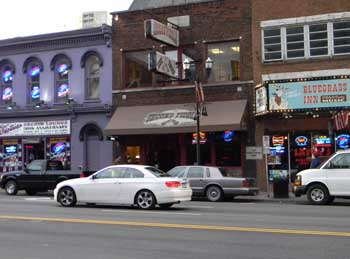 about 20 minutes looking for a free parking space. After setting up my stuff and hanging for a bit with Ronnie and the band, our night of music began. Ronnie played a mix of contemporary country ranging from Travis Tritt to Little Texas, some 80s and 90s country/pop from groups like Exile, a few old school country tunes, R&B from the likes of Delbert McClinton and Van Morrison, and some classic rock from groups like the Eagles, the Allman Brothers, and Steve Miller. His wife also sang harmony and lead vocals and fronted the band on a few songs by artists like Martina McBride and the Dixie Chicks.
about 20 minutes looking for a free parking space. After setting up my stuff and hanging for a bit with Ronnie and the band, our night of music began. Ronnie played a mix of contemporary country ranging from Travis Tritt to Little Texas, some 80s and 90s country/pop from groups like Exile, a few old school country tunes, R&B from the likes of Delbert McClinton and Van Morrison, and some classic rock from groups like the Eagles, the Allman Brothers, and Steve Miller. His wife also sang harmony and lead vocals and fronted the band on a few songs by artists like Martina McBride and the Dixie Chicks.
I knew a lot of the material and managed to feel my way through the songs I didn’t know. We played a couple of long sets with a break in the middle and, although people wandered in and out of the club all night, I don’t think the crowd ever got above 15 or 20. Nevertheless, the music was enjoyable and we all had a good time playing. At the end of the night I tore down my gear and waited for Ronnie to count the tips (I think the grand total was something like $28 apiece including the base pay of $20 each). The short pay was all right with me, as I was still trying to gain experience and make connections. Ronnie thanked me and asked me if I wanted to play the following Monday, which of course I did, and told him so.
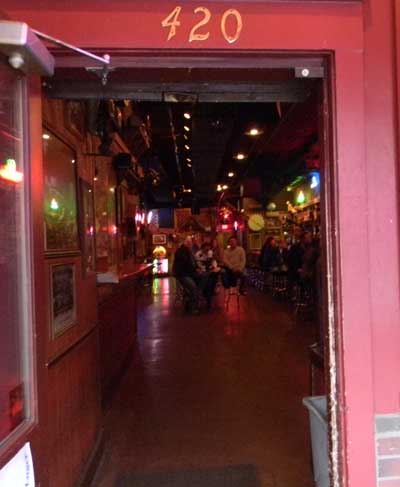 So this became my first regular in town gig. And it was perfect. Ronnie was a real laid-back singer to work for, he always had a decent rhythm section, and his repertoire consisted of a lot of pop, rock, and R&B; styles I was already familiar with. He did play just enough contemporary and classic country for me to explore my new chops in that area as well.
So this became my first regular in town gig. And it was perfect. Ronnie was a real laid-back singer to work for, he always had a decent rhythm section, and his repertoire consisted of a lot of pop, rock, and R&B; styles I was already familiar with. He did play just enough contemporary and classic country for me to explore my new chops in that area as well.
Gigging with Ronnie also created some other opportunities. After a month or so of these gigs I did an out of town weekend with Ronnie and his band in Georgia. It was on that gig where I met a keyboard player Ronnie had hired named Gordon, and it was through Gordon that I landed the house gig at Libby’s in Kentucky.
Another connection I made was through one of our regular attendees, a truck driver named ‘Bud’ who worked for Charlie Daniels and took a liking to my guitar playing. He stopped in for our gig once in a while when he was in town, eventually hooking me up with a friend of his who had an indie band called “The Watercolor Project”. I wound up doing some recording sessions with this trippy rock band, a project and genre that allowed me to gain some studio experience in a far more relaxed setting than my virgin studio outing , a debacle that almost sent me packing a couple of months prior.
So I was getting my country/pop thing happening by gigging with Ronnie on Monday nights, and honing my chops on traditional country on the weekends in Kentucky. While it was a lot of activity it still didn’t add up to enough to pay the bills, so I was still working the eBay/pawn shop angle pretty hard. One of my eBay sales, that of an old Tube Screamer that I sold for $75, was bought by another Nashville guitarist who suggested meeting in town to buy the pedal rather than shipping it. I e-mailed him about meeting at my Monday night gig, and the following week he arrived to do the transaction. This led to one of the biggest eye openers I had in that first year.
I arrived downtown for my regular Monday night gig with Ronnie and set up my gear. After the first set I was still standing on the stage for a few minutes when a long-haired fellow approached me. “Are you Eric?” he asked. “Yes.” I answered “You must be Mark.” After exchanging a few brief words I presented him with one slightly beat up Ibanez Tube Screamer and he paid me $75 in cash. He then asked 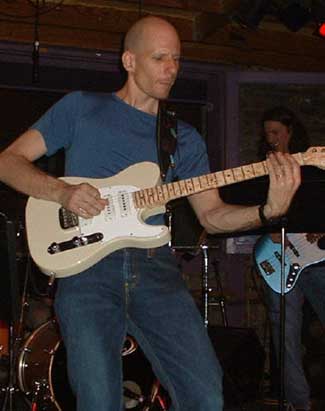 me how long I had been in town, to which I answered “I’ve been here for about six months.” He reacted with surprise, acknowledging my accomplishments with “Wow, that’s great. Six months and you’re already gigging.” He then added “I’m still working towards playing out, I’m not quite there yet, but I’m getting close. I’ve been in a couple of different bands so far, but nothing that’s made it out of the practice hall yet.” “How long have you been here?” I asked innocently. “Five years.” He answered and a deafening silence engulfed the moment.
me how long I had been in town, to which I answered “I’ve been here for about six months.” He reacted with surprise, acknowledging my accomplishments with “Wow, that’s great. Six months and you’re already gigging.” He then added “I’m still working towards playing out, I’m not quite there yet, but I’m getting close. I’ve been in a couple of different bands so far, but nothing that’s made it out of the practice hall yet.” “How long have you been here?” I asked innocently. “Five years.” He answered and a deafening silence engulfed the moment.
The stark reality that there are musicians trying to find their way in Nashville that are here for years had yet to stare me in the face with such clarity. It was almost as if an atomic bomb had been dropped right outside of the club. “I’m sorry to hear that, best of luck to you with that.” I mean, what else can you really say? A minute or so later we said goodbye, and the long-haired struggling stranger sauntered out the door.
For me, that moment clarified a lot of things. It made me realize that there are far more musicians here than there are opportunities for them. It reaffirmed some of the advice I had received from my mentor, D, one piece being “Whatever you do, don’t join a band, band’s starve.” It made me further appreciate the fact that I was lucky enough to have a mentor here in the first place. It allowed me to view all of my gigs and performance opportunities with much more optimism. And it made me realize, in a town where so many struggle, just how fortunate I had been so far.
During the summer of 2002 I was aggressively exploring the live music scene of Nashville. Upon the recommendation of my friend, D, I was regularly making the rounds at clubs on Broadway, Printers Alley, and other spots around the city to better understand the scene, and to begin building the relationships I would need to succeed here. For the most part I was in kind of a watch and learn mode, often finding a table with my wife at the back of these clubs and just listening to the performers, sometimes even writing down the names of unfamiliar songs on napkins to learn later. Most of my musical background is rooted in rock, blues and jazz, so the repertoire played by most of these artists and bands, being mostly country, was largely foreign to me. Not to mention the art of country guitar playing, partly based on a technique called “chicken pickin”, was something I had yet to conquer.
I had already successfully sat in on a few occasions, carefully choosing situations that would allow me to showcase on songs and styles that were familiar to me, but for the most part I had avoided sitting in with bands that played mainly country. D had conveyed to me the importance of slowly building a great reputation – “Good news travels slow, but if you fart on stage they will immediately hear about it all over town.” So I was slowly and carefully building my reputation. But this cautious approach prevented me from sitting in on many occasions, fearful that I would get in over my head. D respected the fact that I was being cautious, but he also knew that I was beginning to become pigeonholed as a rock player as I never sat in on country tunes. So maybe that was part of the reason he invited me to a 6 to 10 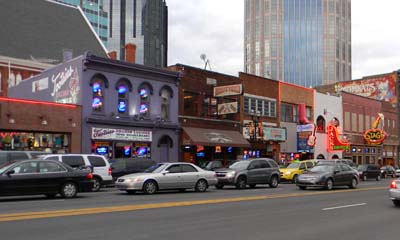 shift he was playing on a Saturday night in the front room of Tootsies.
shift he was playing on a Saturday night in the front room of Tootsies.
My wife, Kelly, and I arrived downtown around seven o’clock and found a parking spot. The summer air was hot and thick and people were out in abundance. We walked into Tootsies, which was packed to the gills, and found a spot to stand near the bar a few feet from the tiny stage. D spotted us and gave me a nod. He was playing with a stripped down Broadway unit of drums, bass, and guitar, fronted by an otherwise typical looking country singer sporting a cowboy hat, cowboy boots, denim shirt, and Wrangler jeans. The band was cranking out country standards in rapid succession, the tempos were fast, the music was loud, and the crowd was partying heavily. After an hour or so D looked over at me and said “Do you want to play a couple?” Feeling that I needed to rise to this occasion, I nodded yes and walked over to the stage.
As I hopped up on to the overcrowded stage he handed me his guitar and said “Just ask the bass player if you don’t know the changes, he’ll help you through.” I had just barely strapped on the guitar when the singer shouted out “OK boys, Rocky Top in G”, a country standard I 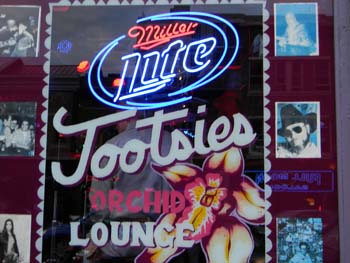 had heard on several occasions but had yet to play. It just so happened that the singer was playing an acoustic and, as the first verse is just acoustic and vocals, this gave me time to figure out the chord progression. So when the whole band came in after the first chorus, I was right there with them, sort of. While I did manage to improvise, or fumble, my way through the first solo without any glaring problems, apparently I was a little heavy handed on the rhythm of the next verse, probably due to years of playing in rock bands combined with almost no experience playing country. D motioned from his spot at the bar to hush my volume a little and I attempted to do so. I managed to get all the way to the end of the main part of the song, hanging on by a thread, before it began to get ugly.
had heard on several occasions but had yet to play. It just so happened that the singer was playing an acoustic and, as the first verse is just acoustic and vocals, this gave me time to figure out the chord progression. So when the whole band came in after the first chorus, I was right there with them, sort of. While I did manage to improvise, or fumble, my way through the first solo without any glaring problems, apparently I was a little heavy handed on the rhythm of the next verse, probably due to years of playing in rock bands combined with almost no experience playing country. D motioned from his spot at the bar to hush my volume a little and I attempted to do so. I managed to get all the way to the end of the main part of the song, hanging on by a thread, before it began to get ugly.
For those of you unfamiliar with this Broadway classic, the main body of the song is played with a half-time feel, the song modulates up a whole step, and then the song kicks into double time for a long-winded fiddle solo outro. So, being the only soloist in this situation, it was my job to mimic the fiddle solo, and I managed to do so quite poorly. While I had been practicing my chicken pickin’ technique daily for a couple of months by this point, this was probably my first practical application. I quickly learned that practicing this style with a metronome or CD at home, and improvising a would-be fiddle solo at warp 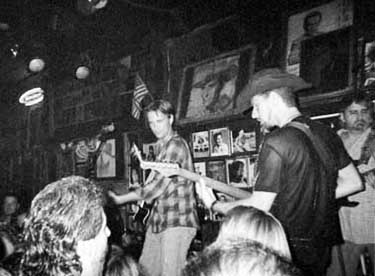 speed with a band in a nightclub are two different things. No matter what I heard in my head, my fingers just wouldn’t do it. I hacked, chopped, and butchered my way through two long choruses that seemed to drag on for eternity.
speed with a band in a nightclub are two different things. No matter what I heard in my head, my fingers just wouldn’t do it. I hacked, chopped, and butchered my way through two long choruses that seemed to drag on for eternity.
The song ended and the crowd of tourists cheered, completely oblivious to my train wreck. But I am certain that the other players on stage did hear every single ugly note I played. D certainly did as he quickly came to my rescue, snatching the guitar from my hands before I could do any more damage. “That one got away from you a little bit.” he kindly said as I left the stage. Feeling less than excited about hanging around after this awkward moment, we left after a couple more songs.
The next day D called me and we spoke about my debacle. “I think you should stay away from Broadway for a little while, at least until you get a little more familiar with the songs and the style. The guys I was playing with last night are cool and know you’re still learning, so there’s no harm done there. But you definitely don’t want to want to do anything like that again.”
I had already been playing guitar for over 20 years and could play rock and blues as good as most. But country music wasn’t yet in my vocabulary, and chicken pickin’ was as foreign to me as French Morocco. It was like learning how to play guitar all over again. That one train wreck made it apparent to me that I was going to have to practice for three to four hours a day for quite a while to learn this new language. So that’s just what I did. I obtained recordings of as many country standards as I could and burned mix CDs. I began dissecting the songs, writing number charts for them, learning arrangements, rhythms, solos, even bass lines. As chicken pickin’ is essential to traditional country guitar playing, I followed one piece of great advice from D “Put on a CD of old-school country and improvise solos over entire songs using the chicken pickin’ technique.” I forced myself to do this and, although I sometimes felt like throwing my guitar through the window, slowly began to see improvement. I was determined to never have another moment like my debacle on Broadway ever happen again. And while I did eventually get the hang of chicken pickin’, to this day, I still cringe every time I hear Rocky Top!
